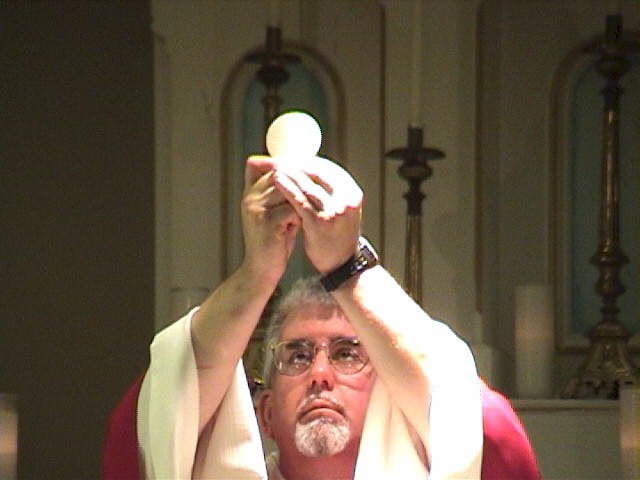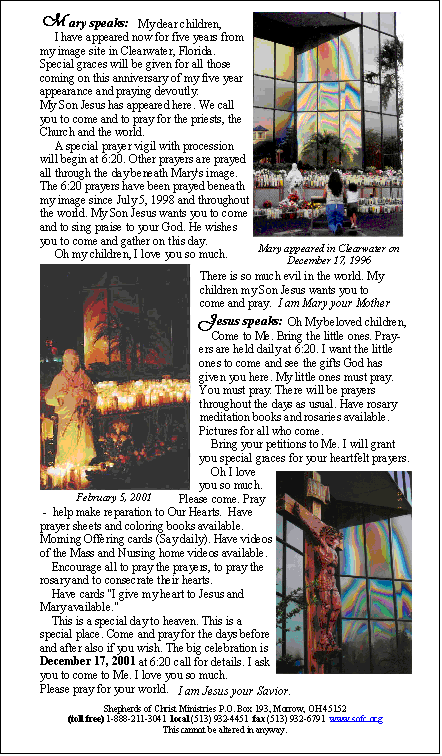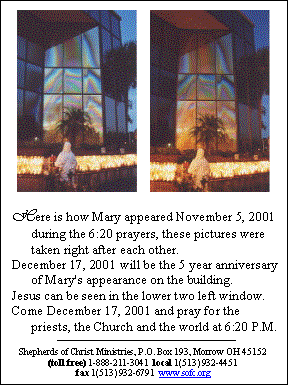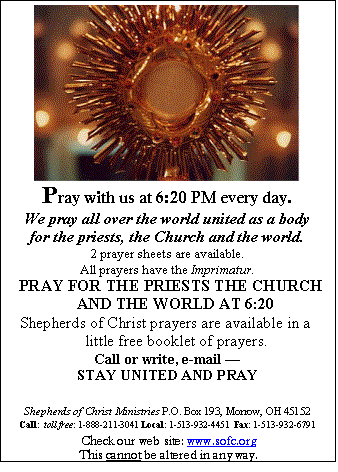Our
incorporation into the mystery of Christ at baptism, and the gradual
maturing of that life in the process of becoming, is centered in the pattern
of death-resurrection. Indeed, the theme of death-resurrection is at the
heart of salvation history. Let us briefly consider its place in the Old
Testament, in the New Testament, and in God's ongoing self-communication,
always remembering that any form of death—that is, any form of
suffering—is meant to lead to greater life, greater peace, and greater
happiness.
The
theme of death-resurrection is at the heart of Old Testament history. The
Jewish people, under the leadership of Moses, experienced death-resurrection
as they were formed into the people of the covenant—Yahweh's people. In
the great Exodus event, they escaped Egyptian slavery, went on to Mt. Sinai
where the covenant was ratified, and then progressed to the Promised Land.
As members of the Mosaic covenant—as Yahweh's people—the Jews
experienced a religious transition; they passed over to a higher level of
religious existence, to a more intimate union with God.
This
religious transition contained death-resurrection. For the Jews to become
people of the covenant, to remain so, and to grow in the life of the
covenant, it was necessary that they undergo a mystical or spiritual death.
In short, the Jews had to be willing to pay a price; they had to be willing
to bear with that which was difficult in covenant life; they had to be
willing to die to that which was not according to Yahweh's will. This
mystical death, however, had a very positive purpose; it was directed at
life in the covenant and at growth in that life. This spiritual death, in
other words, was aimed at resurrection.
Christ perfectly fulfilled the Old Testament theme of death-resurrection. In
doing so, he, too, was experiencing a religious transition. He was passing
over—gradually, at first, and then definitively in his death—to a new
kind of existence, to the life of his resurrection, which he achieved not
only for himself, but for all mankind. To achieve this new life of
resurrection, Jesus was willing to pay the price; Jesus was willing to
suffer, even unto death. That it had to be this way—that the only way
Christ could have achieved resurrection was through suffering and
death—was pointed out by Jesus himself to the two disciples on the road to
Emmaus: "Then he said to them, 'What little sense you have! How slow
you are to believe all that the prophets have announced! Did not the Messiah
have to undergo all this so as to enter into his glory?' Beginning, then,
with Moses and all the prophets, he interpreted for them every passage of
Scripture which referred to him" (Lk 24:25-27).
Christ has structured the Christian life by the way he lived, died, and rose
from the dead. It is obvious, then, that the pattern of death-resurrection
must be at the heart of the Church's life. Individually and collectively, we
continually die with Christ so that we may continually rise with him. Thus,
we pass over in a process of continued religious transition to a greater
participation in Jesus' resurrection. It is true that our participation in
Christ's resurrection will reach its completion only in eternity.
Nevertheless, we begin the life of resurrection here upon this earth, in the
here and now of human life, in the midst of joy and pain, in the experience
of success and failure, in the sweat of our brow, in the enjoyment of God's
gifts. As Christians, we should have a sense of growth concerning our
here-and-now life of resurrection. Some Christians seem to have a rather
static view of the Christian life. They do not seem to have a vital and
efficacious realization that the Christian life, centered in
death-resurrection, should become more conscious, more experiential, more
dynamically relative to daily existence.
We
cannot maintain the life of resurrection or grow in it without a willingness
to suffer. This does not mean that we need to feel overwhelmed and heavily
burdened by the suffering in our lives. The greater portion of suffering for
most Christians seems to be an accumulation of ordinary hardships,
difficulties, and pains. At times, however, deep suffering—even suffering
of agonizing proportions—can enter one's life. During these oppressive
periods of suffering, a person's sense of anguish can become so great that
the prospect of continuing life becomes an agony in itself. Whether the
sufferings of Christians are of either the ordinary variety or the rare and
extreme type, Christians must nevertheless convince themselves that to
properly relate to the cross is to grow in resurrection—and for an
individual Christian to grow in resurrection means that he or she will also
have an increased capacity to help give resurrection to others.
One
of the most traditional forms of the experience of the cross—that is, of
dying with Jesus—that spiritual masters have always treated is
self-discipline or asceticism. All forms of life demand self-discipline: The
athlete must subject himself or herself to rigorous training; the musician
must endure long hours of practice; the doctor must be willing to order his
or her life to the rigorous demands of the medical profession.
The
Christian life, too, has its own form of discipline or control that has as
its comprehensive purpose the greater assimilation of the Christian's total
being to Christ. Christian self-discipline, or asceticism, allows for the
proper development of the Christ-life in all its dimensions. Like all forms
of authentic discipline, it is at the service of life; when it is properly
exercised, asceticism helps us to grow in our capacity to love God and
others.
This
proper, grace-inspired control over the complete person is necessary because
the various sense and spiritual faculties do not automatically follow the
lead of grace. Because of original sin and personal sin, there are various
tendencies within us that, if they are not properly controlled, will lead us
away from Christ and our spiritual development. The Christian, therefore,
must be willing to exercise a reasonable self-discipline despite the
difficulty that is involved. Moreover, this control must extend to all of
the person's faculties.
Regarding our intellectual lives, there are various tendencies inimical to
the spiritual life that must be disciplined. There can be a laziness, for
instance, that might prevent the proper pursuit of study that is necessary
for our own particular role in the Church. There can be an unwholesome
curiosity that might lead us to want to know that which is pleasing, rather
than, first of all, that which is necessary. There can be an intellectual
pride that might manifest itself in various ways; some people, for example,
find it extremely difficult to be open to the ideas of others or to admit
their own mistakes.
The
will, the decisive faculty of the human person, must receive special
attention. It must become both supple and strong: supple in order to be open
to the varied movements of the Holy Spirit; and strong in order to guide the
entire person, including those forces that can so powerfully lead away from
God. Concerning concrete decision making, there are two extremes that must
be avoided: On the one hand, we must avoid precipitous action that is devoid
of reflection that is rooted in an appropriate openness to the movements of
the Spirit; on the other hand, we must not fall prey to the habit of
indecision. Some people are prone to spending an excessive amount of time in
making decisions about even the simplest matters. Life is short, and we must
condition ourselves to make decisions after appropriate reflection, which,
in many of our ordinary actions and decisions, is practically instantaneous.
Unhealthy fear and other factors that are responsible for indecision must be
curbed despite the great pain that this can, at times, cause for certain
temperaments.
The
faculties of memory and imagination must also be controlled. These can be of
great value if properly guided; if they are not properly guided, however,
they can, in their unruliness, become great obstacles to spiritual progress.
An undisciplined memory and imagination can, for example, seriously
interfere with our prayer life. Similarly, memory and imagination that are
not properly controlled can also give rise to numerous temptations against
the various virtues.
We
must also properly control the emotions. A considerable portion of past
spiritual literature has not given due allowance to the role that God
intends the emotions to exercise. When we speak of controlling the emotions,
therefore, we are not suggesting either an aggressive repression or an
inhuman rigidity; rather, we speak of a control that permits the emotions to
contribute to the richness and overall value of our actions. We must
remember that the emotions, when they are properly integrated with the
movements of the intellect and will, enhance the goodness of our acts.
It is
obvious, however, that we must strive to discipline the emotions' evil
tendencies if these emotions are to contribute to spiritual growth. The
emotions can cause havoc if such a discipline is lacking. At times, they can
reduce a person to an almost brute existence; at other times, they can
seriously constrict a person and, consequently, seriously impede the proper
exercise and development of the Christian life.
It is
equally obvious that a person's bodily nature should also be the subject of
proper discipline. The body is essentially holy, partaking in the holiness
of Christ's body; however, the body is also subject to numerous evil
tendencies that are at war with the spiritual life and must be controlled
with a sound asceticism. St. Paul reminds us of this: "I do not run
like a man who loses sight of the finish line. I do not fight as if I were
shadowboxing. What I do is discipline my own body and master it, for fear
that after having preached to others I myself should be rejected" (1
Cor 9:26).
Renunciation is another form of dying with Jesus that, over the ages, has
been given much attention in the teaching of the spiritual masters. Indeed,
the New Testament itself attests to the undeniable role that renunciation
plays in the Christian life. The gentle St. Luke, for example, teaches with
a peculiar intransigence Jesus' message of renunciation—a message that
Jesus himself lived. Renunciation was by no means the only aspect of
Christ's life, but it was an undeniable one. Christians, because they are
followers of Christ, must also include renunciation in their lives
regardless of their individual vocations. Again, it is well to remind
ourselves that the cross is always intended to be connected with life and
love. Paradoxically, then, we embrace renunciation for the sake of life.
This was the purpose of renunciation in Jesus' life, and it must have the
same purpose in the Christian's existence. Let us now consider some of the
various ways in which the principle of renunciation applies.
Self-discipline or asceticism, which we have already discussed, does not
necessarily include the aspect of renunciation. A person can exercise
self-discipline in the positive use of created goods, and renunciation would
not be involved; rather, the person would be relating to a created good
according to God's will. Renunciation is, however, sometimes related to the
practice of self-discipline; a person cannot always properly relate his or
her total being to God's creation unless, from time to time, he or she is
willing to renounce particular goods and values. Consider this example: A
person will not always properly employ his or her external senses in using
God's creation unless, at times, he or she denies the senses what they
naturally desire. If we are not willing to admit this, we are being falsely
optimistic about human nature. There is a sinful element within us that
inclines us to a misuse of creation. To control this tendency toward misuse,
we must exercise renunciation of those goods toward which our various
spiritual and sense faculties are oriented.
In
addition to being an aid to self-discipline, there are other uses of
renunciation. The choice of a particular vocation or life's work, for
instance, demands a renunciation of various other created goods and values.
A person who chooses marriage has to be willing to sacrifice certain values
and activities that might well be appropriate for a single person, but are
incompatible with the married vocation. The Christian scholar, who is called
by God to make his or her contribution to the life of the Church in the
academic sphere, must also learn the lesson of renunciation; such a person
cannot be true to the demanding work of scholarship unless various human
values—all of which are good in themselves—are nevertheless sacrificed.
Another use of renunciation is its special witness to the transcendent
aspect of the Christian life, one element of which is that our life of grace
is a participation in the transcendent life of God. This life has a radical
thrust of desiring God as he is in himself; this particular desire will not
be completely satisfied until we achieve the beatific vision in which we
will possess God as he is in himself, without the mediation of the world.
Here on this earth, however, we can, to a certain extent, go out to God as
he is in himself. Among the methods for achieving this goal is the practice
of renunciation. Speaking of this kind of renunciation, which is expressive
of transcendent love of God, Karl Rahner observes: "For such
renunciation is either senseless or it is the realized and combined
expression of faith, hope and charity which reaches out toward God precisely
insofar as he is in himself, and without any mediation of the world, the
goal of man in the supernatural order" (Theological Investigations,
vol. 3, pp. 51-52). God, then, wants us to seek him not only as he is
immanent in creation, but also as he is transcendent in himself. To
reiterate, one way to achieve this is through the prudent, periodic
renunciation of created goods and values.
We
have been discussing two main forms of dying with Jesus, namely, self-discipline, or asceticism, and renunciation. These traditional forms of
the Christian cross actually permeate the experience of numerous and various
kinds of pain, suffering, hardship, bearing with the difficult—whatever
name one wishes to apply. Let us consider some of these ways in which we are
daily called to mystically share in the death of Jesus.
self-discipline, or asceticism, and renunciation. These traditional forms of
the Christian cross actually permeate the experience of numerous and various
kinds of pain, suffering, hardship, bearing with the difficult—whatever
name one wishes to apply. Let us consider some of these ways in which we are
daily called to mystically share in the death of Jesus.
A
common form of suffering is the experience of loneliness. Trying to cope
with loneliness, in fact, seems to be one of the major problems of our day,
and some think that the problem is perhaps greater in the United States than
anywhere else in the world. Loneliness, of course, is not limited to urban
centers, but it does seem to haunt our crowded cities in a special way.
Ironically, it seems that the more populated an area becomes, the more
possibilities there are for loneliness.
There
are two basic kinds of loneliness—that which need not be and that which
cannot be avoided. The first type of loneliness results from the fact that
we are not in proper touch with our true selves, with God, or with others;
the second type results from our existential situation as wayfarers, as
pilgrims, who have not yet arrived at our final destination. The pain that
results from the first type need not be, and we should work to eliminate its
causes. The suffering and dying that are related to the second kind,
however, are inevitable. As Christians, we should use this suffering and
dying to grow in various ways, among which is the maturing realization that
we have no lasting home here on earth.
There
is, in addition, the very prosaic type of suffering that is involved in the
proper living of each day. There is nothing dramatic about this form of
pain, and, precisely because it seems so uneventful, it is very difficult to
properly relate to it in a consistent fashion. On particular occasions, we
might feel that a quick death by martyrdom would be preferable to the daily
dying that involves all sorts of little sufferings. But this daily dying is
a precious type of suffering, and to grow in the realization of its
importance is a significant sign of spiritual progress. It is a sign that we
have the spiritual keenness to comprehend that God so often situates the
cross within the ordinariness of everyday life.
Crucial decision making is also a distinct form of dying. Making a decision,
we realize, is extremely important for both ourselves and others. There
might be two possibilities or three or even more. We might seek advice from
others, but in the last analysis, we know—oh, how well we know—that,
ultimately, we alone must make the decision before God. We pray for light
and strength, for we realize that we need help not only to make the proper
decision, but also to properly deal with the pain that is inevitably
involved.
The
experience of failure is another suffering that we encounter in various
degrees along the path of life. Some fail in their attempts to achieve the
type of employment they so much desire; others fail to perform properly once
they have been so employed. Some are not very successful in initiating
interpersonal relationships; others are not very successful in maintaining
the ones in which they do become involved. Some experience failure because
they strive to accomplish too little; others experience failure because they
strive to do too much. Some encounter failure because they have not given
the proper effort; others feel failure's pain despite their conscientious
perseverance. In these and in other types of failure there is a double
pain—the pain of having failed and the pain in having to begin over again.
The pain of having failed, however, must not be wasted; we must use it to
become better persons. If we do use it, we are able to cope more maturely
with the effort that is involved in beginning afresh.
Experiencing various types of transition along the path of life also
produces its own kind of pain. Periods of transition from one age of life to
another are numerous, and some are obviously much more radical than others.
The transitions from childhood to adolescence, from adolescence to young
adulthood, from young adulthood to middle age, from middle age to old age
produce various, and sometimes rather intense, kinds of sufferings. There is
the classic kind of pain that adolescents experience, for example, as they
grope for some kind of self-identity, as they try to cope with various types
of peer pressure, as they struggle for a new kind of relationship with
parents because their childhood relationship no longer suffices. These
periods of transition, or life-stages, also involve changing interests and
goals; that which held our interest at one stage of life leaves us bored at
another. To establish a new set of interests and challenges is sometimes
painful, but not so painful as the boring vacuum that we must exist in if we
fail to replace those now-dead interests and goals with new ones.
Another type of transition involves our work-life. During the past decade,
people have increasingly experienced the necessity, and sometimes the
desirability, of making work or professional changeovers. Whereas in the
past a person would more or less be expected to remain in the same skilled
labor or professional position for the duration of his or her working years,
today it is not uncommon for a person to embark upon several or more career
changes. These changes, even when the desire for a change rather than a
circumstance of necessity has been the catalyst, involve the inevitable
difficulties that accompany the adjustment to new surroundings, different
coworkers, and different responsibilities.
Furthermore, work or professional changeovers sometimes demand a change in
residence, not only to vastly different parts of the country, but even to
other parts of the world. The transition that involves a change of
residence, in fact, is a growing characteristic of our times. We are
definitely becoming a much more mobile and transient population; however,
even when persons freely seek these changes in residence, they can
experience considerable hardship. One must die a bit—one must separate
himself or herself from people, places, customs, landmarks that he or she
has perhaps cherished over a long time. Not to feel this jolt, this
separation, this dying, would mean that one possessed less than a sensitive
heart.
Rejection, in various forms, is another pain not uncommon to human
experience. Rejection because of race, religion, or ethnic origin has been,
sad to say, a rather prominent part of our country's history. Blacks, in
particular, have felt the wrath of racial rejection and discrimination.
Others, too, have not been immune—this group includes, among others,
American Indians, Puerto Ricans, and Mexican-Americans.
Although we ourselves might not have suffered racial, ethnic, or religious
rejection, we are certainly susceptible to other types. We may have
experienced, for instance, a certain ostracism in not being accepted—or
being only reluctantly accepted—by this or that group, by this or that
organization. When our ideas and opinions are not accepted by others, we
feel the sting of yet another type of rejection. Further still is that very
painful yet all too common rejection of not feeling loved by the person whom
we dearly love.
The
type of rejection that we experience—no matter what it might be—carries
with it its own kind and degree of suffering that we can neither deny nor instantaneously cause to go away; we can, however, profit from its painful
presence. One of the things we must do in order to grow from the rejection
that we experience is to refuse to harbor bitterness against the person or
persons who have caused us pain. Not to be bitter can be difficult—at
times, it can be very difficult. If we do remain bitter, however, our
suffering is increased by a type of pain—the pain of bitterness—that is
not growth promoting, but is, rather, pernicious to the well-being of our
personality.
instantaneously cause to go away; we can, however, profit from its painful
presence. One of the things we must do in order to grow from the rejection
that we experience is to refuse to harbor bitterness against the person or
persons who have caused us pain. Not to be bitter can be difficult—at
times, it can be very difficult. If we do remain bitter, however, our
suffering is increased by a type of pain—the pain of bitterness—that is
not growth promoting, but is, rather, pernicious to the well-being of our
personality.
The
experience of various kinds of uncertainty is another type of suffering, or
dying. The list of examples of human uncertainty is a long one. There is the
uncertainty that is connected with the approach of a first experience: the
young doctor who is still in training, for example, is understandably
apprehensive as he or she prepares for his or her first surgery. There is
the uncertainty of the young man and the young woman who are about to marry.
Both begin to realize the uncertainties that are attached to marriage: Am I
really marrying the right person? Will the children be normal and healthy?
Will my partner love me over a lifetime, or is it possible that love will
turn to coldness or even hatred? Likewise, the young businessman wonders
whether the financial investment that he is about to make will result in
increased earnings or ultimately lead to bankruptcy. There is also that
common uncertainty that has plagued men and women of our contemporary
age—namely, the question of whether life as we now know it on this earth
will suddenly end in a nuclear holocaust.
Christians, of course, experience these same uncertainties to the same
extent that non-Christians experience them. Christians, however, precisely
because they are Christians, should react to uncertainty and assimilate it
in a manner that will differ from that of non-Christians. The Christian life
is, after all, supposed to extend to all the dimensions of authentic human
existence—including the experience of uncertainty.
There
is, however, a way in which Christians experience uncertainty in a manner
that differs from non-Christians. There are specific uncertainties that
explicitly arise out of Christian practices. Let us consider a few examples.
In deciding one's basic state of life, the doubt, confusion, and anxiety
that can temporarily accompany a choice of vocation can be agonizingly
painful for some people. There are, in addition, the uncertainties and
obscurities that, at times, accompany spiritual development in general. In
the practice of prayer, for instance, there can be dryness, or an apparent
inability to encounter God, even though God is really present to the person.
There can also be a certain repugnance as one feels the demanding effort
that is required to pray in present circumstances, as well as the bothersome
uncertainty that makes us wonder whether our prayer is the proper type for
us here and now.
What
is more, various uncertainties surround the seemingly contradictory
manifestations of God's will. There might be, for example, a certain
indication that God would have us act in a particular way, yet his will, as
it is channeled to us from a different perspective, seems to suggest another
course of action. Of course, God never contradicts himself; the
contradiction is only an apparent one. We are not without pain, however, as
we work through the confusion and uncertainty.
How
should we Christians act in times of uncertainty? We must be conscious of
the two great realities of love and trust. First, we must try to be
particularly conscious of how much God loves us in Christ. This deepened
realization, in turn, will lead us to return that love in such a way that
our love will be characterized by an abandoning trust in God's providence
for us. Consequently, times of uncertainty can be times of tremendous
growth. For we are creatures who all too often can become self-complacent
before God; we are prone to forget just how weak and helpless we are without
God. The discomfort of uncertainty, then, can help arouse us from this false
sense of security because at these times we become more conscious of our
helplessness and we approach God for guidance, strength, and consolation.
When
we experience uncertainty we should also be aware that, although we do not
possess all possible light, we do have enough light to properly cope. The
general pattern of Christ's life is always before us as an example and can
be lived out in circumstances of uncertainty as well as at any other time.
We can also utilize particular means that can lessen or even dispel the
uncertainty, or that will at least help us to properly cope. Examples of
such means are prayer and the seeking of advice from competent persons—if
the particular uncertainty indicates that the counsel of another or others
would be helpful.
We
have been discussing some of the specific ways in which we experience
suffering. Let us now end this discussion in the same way that we began—by
reminding ourselves of suffering's purpose in God's overall plan. Suffering,
when it is properly encountered, leads us to a more mature Christian
existence, that is, to an increased participation in Jesus' resurrection. If
it is unchristian to flee the suffering that God intends for us (we are, of
course, allowed to take proper means, as indicated by God's will, to dispel
or alleviate suffering), it is also unchristian to view suffering out of
perspective. We should view suffering, or dying with Christ, in relation to
growth in the life that Jesus came to give us in abundance. As we properly
encounter suffering, we are more and more cutting through the layers of the
false self and increasingly coming in touch with the true, Christic self. If
we live according to this true self, we become more capable of loving God
and our fellow human beings. We become more vibrant personalities, more
sensitive to the true, the good, the beautiful. We concentrate on the good
that God's love has put in creation rather than on the evil therein that
results from man's sinfulness.
creation rather than on the evil therein that
results from man's sinfulness.
Although we might endure suffering with a proper Christian perspective, this
is not to say that we find it easy to suffer. We need constant motivation
for the proper assimilation of the suffering that daily faces us. This
motivation, in turn, must be centered in the remembrance of the one who has
suffered before us:
Though he was harshly treated, he
submitted
and opened not his mouth;
Like a lamb led to the slaughter
or a sheep before the shearers,
he was silent and opened not his
mouth.
Oppressed and condemned, he was
taken away,
and who would have thought any
more of his destiny?
When he was cut off from the land of
the living,
and smitten for the sin of his people,
A grave was assigned him among the
wicked
and a burial place with evildoers,
Though he had done no wrong
nor spoken any falsehood.
—Is 53:7-9





 self-discipline, or asceticism, and renunciation. These traditional forms of
the Christian cross actually permeate the experience of numerous and various
kinds of pain, suffering, hardship, bearing with the difficult—whatever
name one wishes to apply. Let us consider some of these ways in which we are
daily called to mystically share in the death of Jesus.
self-discipline, or asceticism, and renunciation. These traditional forms of
the Christian cross actually permeate the experience of numerous and various
kinds of pain, suffering, hardship, bearing with the difficult—whatever
name one wishes to apply. Let us consider some of these ways in which we are
daily called to mystically share in the death of Jesus. instantaneously cause to go away; we can, however, profit from its painful
presence. One of the things we must do in order to grow from the rejection
that we experience is to refuse to harbor bitterness against the person or
persons who have caused us pain. Not to be bitter can be difficult—at
times, it can be very difficult. If we do remain bitter, however, our
suffering is increased by a type of pain—the pain of bitterness—that is
not growth promoting, but is, rather, pernicious to the well-being of our
personality.
instantaneously cause to go away; we can, however, profit from its painful
presence. One of the things we must do in order to grow from the rejection
that we experience is to refuse to harbor bitterness against the person or
persons who have caused us pain. Not to be bitter can be difficult—at
times, it can be very difficult. If we do remain bitter, however, our
suffering is increased by a type of pain—the pain of bitterness—that is
not growth promoting, but is, rather, pernicious to the well-being of our
personality. creation rather than on the evil therein that
results from man's sinfulness.
creation rather than on the evil therein that
results from man's sinfulness.





